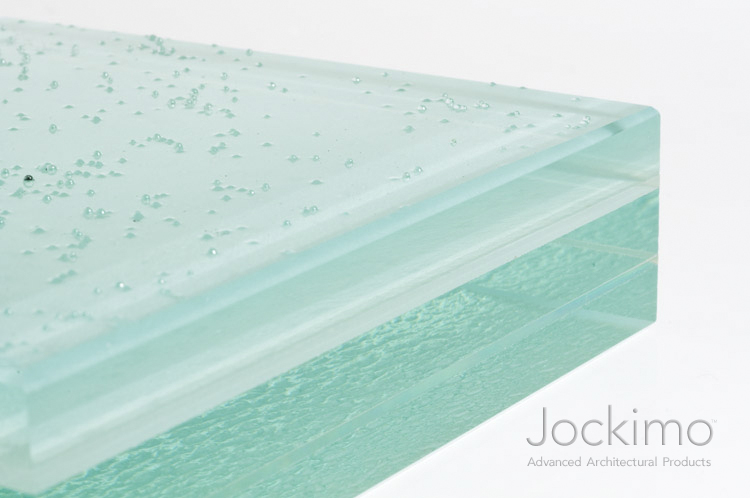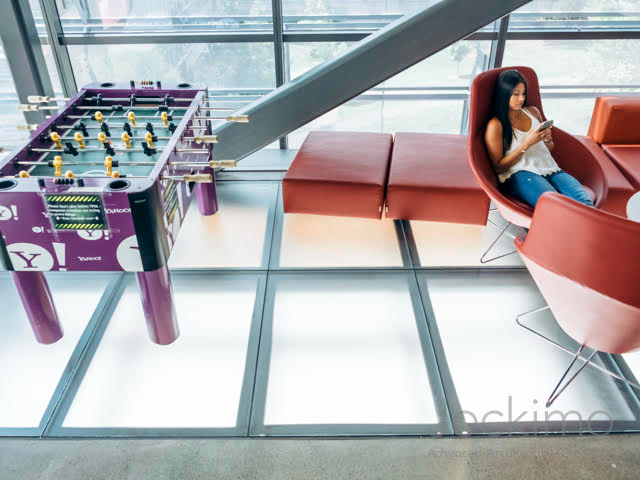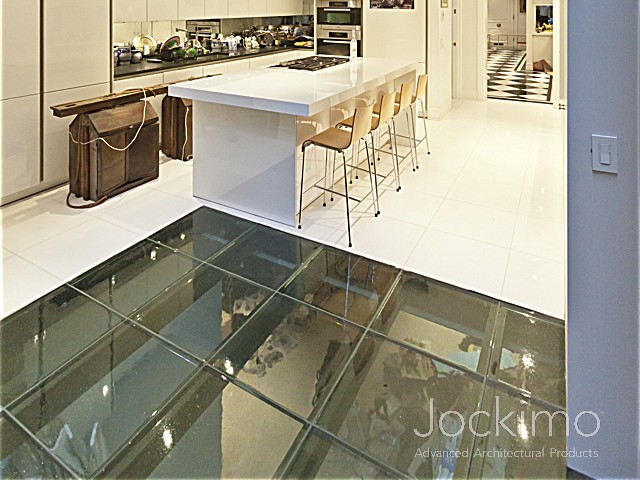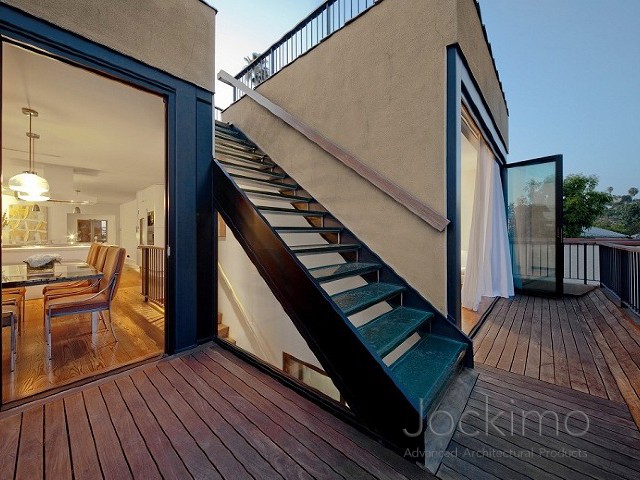Are Glass Floors Safe? 5 Myths about Glass Flooring Debunked
Glass is a beautiful, innovative, modern flooring material in both residential and commercial buildings. However, as you’re looking down into the house from a clear glass floor or to the street below from a deck with incorporated glass panels, it’s essential to know one thing: Is glass flooring safe? Here are the biggest considerations when assessing glass floor safety, as well as common myths (and the facts) about glass floors.
Glass Floors: Are They Safe?
Yes, a walkable glass floor is perfectly safe. When designed, engineered, manufactured, and installed properly, glass flooring is just as safe as any other type of flooring. This is true for both interior glass floors and exterior glass floors.
When it comes to glass flooring, safety should be your number one concern. To determine safety, take these three considerations into account: whether or not the glass is antislip, if there are failure redundancies in place, and the thickness of the glass. Let’s take a look at each aspect in depth below.
Antislip Glass
When using walkable glass in stair treads, a clear glass floor, or walkable skylights, you always want to incorporate antislip glass. This will help ensure the glass is safe to walk on, even in wet conditions. There are several kinds of anti-slip glass floors, but all of them have the same aim: to create more friction to prevent falling, tripping, or slipping while maintaining the beautiful aesthetic of glass floors.

Failure Redundancy
One of the biggest safety considerations when it comes to building with a glass floor is whether or not the glass has a proper failure redundancy engineered into the design.
An example of a failure redundancy is for glass floors to be three-ply. Three-ply glass panels are designed with three pieces of glass “sandwiched” together. This is a safety measure to ensure that if your glass floor did break, the people standing on it would have additional glass underneath their feet to catch and support them. While any clear glass floor that is properly designed should never break, having failure redundancy in place is crucial not only from a general safety and liability perspective but also to simply give you peace of mind as you enjoy your glass floors.
There are a lot of companies that have the equipment to make glass flooring but not necessarily the expertise that goes into glass design. That means there are glass floors being created and installed every day that don’t have this failsafe mode built into the project. That's why it’s imperative you use a reputable glass floor company. If you’re not sure, ask them about their failure redundancy system. If you’re not satisfied with their answer, move on to the next company.
Glass Thickness
A clear glass floor can be safe at varying levels of thickness. Its safety depends largely on the deflection rating, or how much a particular piece of glass flexes or bends at its center point when force is applied. (This force can come from snowfall, wind, the weight of people and other objects on that panel, and more.) Other factors include the support system around the glass and the width that the glass panel has to span.
Glass thicknesses are governed by international building codes, as well as ASTM glass flooring standards. Typically, though, expect a panel for glass flooring to be 1 ¼” thick. Any reliable glass floor company should have glass panels that are at least this thick, and they should be able to tell you the exact level of thickness for any glass floor you order.
Myths (and Truths) about Glass Flooring
Myth #1: Glass Flooring Is Just for Interior Use
Glass floors can absolutely be incorporated into both interior and exterior designs. Whether you’re adding them to create a unique and striking feature in a kitchen or you’re turning a deck into a beautiful way to observe your surroundings in every direction, glass floors are just as safe outside as they are inside.
Whether you are buying glass floors for inside or outside your home, make sure you’re still asking all the relevant questions about anti-slip properties, failure redundancy, and glass thickness before building with a glass floor.

Myth #2: Glass Floors Are Less Strong or Durable Than Flooring Supported by Wood Joists
Very few people ever have concerns about the durability and safety of non-glass floors. However, questions about safety quickly arise for glass flooring. The truth is that as long as the project is designed, engineered, and manufactured by professionals with glass expertise, a glass floor is every bit as strong as any other kind of flooring. In many cases, the strength of the glass itself and the support structure for that glass mean it can actually be stronger than other flooring types.

Myth #3: All Glass Floors Are the Same
Under the umbrella of glass floors, there’s tremendous variability. From the glass itself to the structural design the clear glass floor is incorporated into, no two glass floors are exactly the same.
There are several variables that make glass floors different from each other:
- Glass thickness
- Anti-slip properties
- Glass rigidity
- Span or size of panels
- Interior or exterior use
- Direct sunlight or not
- Anticipated weight load
For the highest level of safety and peace of mind, make sure you’re working with an experienced and knowledgeable glass manufacturer. Based on your project’s specifications, they will be able to recommend, design, and manufacture the safest piece of glass for your needs.
Ideally, the glass manufacturer will individually engineer each and every project, either personally creating an engineering analysis or partnering with qualified engineers who can provide this.
Myth #4: Glass Is Fragile
It’s understandable when people question the durability of glass flooring. Who hasn’t accidentally shattered a mirror or chipped a wine glass with almost no force?
The important thing to remember with glass floors, is that the panels are designed for this kind of application. They’re created to specific thicknesses, the support system is engineered to ensure the entire project is solid and safe, and the glass panels are layered to hold the structural load in case one breaks.
There are glass applications that have lasted thousands of years, and that’s because glass is very strong in compression. Essentially, this means it’s an excellent material for bearing weight.
What glass doesn’t like is blunt trauma. That’s a high impact with a narrow item. While this can cause the glass to shatter, properly designed flooring should still be entirely structurally sound. When used as intended (coupled with a failure redundancy), glass is a highly durable and safe material.

Myth #5: My Only Option Is See Through Glass
This myth is less related to safety, but there is a prevailing idea in the world of building with glass floors that because the material is glass it has to be transparent. For many, transparency poses modesty- and privacy-related concerns. From stairways to walkable skylights, it’s not always desirable to be able to see the people walking above from below.
Luckily, glass is a highly customizable material. While you can get a clear glass floor, it can also be created with a frosted appearance, or it can incorporate designs, textures, or Jockimo's TRUE Colors colored architectural glass that obscure visibility. If privacy issues are a concern, there are many ways to ensure modesty while still capitalizing on the design aesthetics of glass and allowing all that natural light to filter through to multiple levels of the building.
Safety Matters. Ask Questions.
When you order glass flooring from Jockimo, our first priority is everyone’s safety. If you have any questions, concerns, or hesitations about clear glass floors in your home, a walkable skylight, or any other building with a glass floor—no matter what stage it’s in—please feel free to reach out to us. We’ve been in the glass business for decades and would love to lend our expertise to ensure any glass flooring project is just as safe as it is beautiful.

